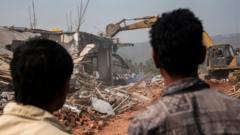In the wake of the Supreme Court ruling against arbitrary demolitions in India, families like Afreen Fatima's seek justice and redress for the losses faced during "bulldozer justice," raising concerns over the realities of rebuilding lives amidst legal reforms.**
The Aftermath of "Bulldozer Justice": Seeking Closure amidst Legal Changes in India**

The Aftermath of "Bulldozer Justice": Seeking Closure amidst Legal Changes in India**
As India's Supreme Court outlaws "bulldozer justice," victims like Afreen Fatima grapple with the emotional and physical toll of home demolitions without compensation.**
The term "bulldozer justice" has become synonymous with a punitive measure used by Indian authorities to demolish homes of those accused of crimes, especially among Muslim communities. In a significant change, India's Supreme Court has prohibited this practice, yet the void it leaves for victims remains unaddressed.
Afreen Fatima, an activist and daughter of arrested politician Javed Mohammad, witnessed her childhood home in Prayagraj demolished in 2022 following her father's alleged involvement in a protest. Though the court has declared such demolitions illegal, it offers little solace to those already affected. "You can be homesick at home," she expresses, reflecting on the emotional void left by the abrupt loss of her home.
The court's ruling, which came after increased scrutiny of the "bulldozer" actions in several states, highlighted the need for legal frameworks to prevent arbitrary demolitions. While the court established guidelines demanding prior notice before demolitions occur, victims like Afreen detail a painful bureaucratic journey for justice that has yet to yield results.
For her family, the memories of their demolished home linger painfully in the past. Afreen mourns the loss of familiarity and warmth that their previous residence provided. As she and her family continue to settle into a new home, she describes it as an "adopted space" lacking the cherished memories that were swept away.
Other cases echo a similar plight, like that of Reshma from Rajasthan, who became homeless after her family's house was demolished following her brother’s legal troubles. Echoing Afreen's sentiments, Reshma emphasizes the urgency for assistance rather than legal rhetoric, asking, "We want actual help, some money or compensation to rebuild our lives."
Despite the court's ruling representing a hopeful turning point, the path to securing justice and support remains convoluted. Legal experts remain cautiously optimistic that these developments will compel courts to rigorously examine how demolitions are executed. Yet, Afreen questions the immediate significance of the ruling, and whether it will lead to meaningful change or simply serve as a temporary measure against a persistent injustice.
With aspirations of building anew, Afreen conveys her father's determination amidst despair—"he keeps telling me, this is a historic order and we have to talk about it as much as we can." In seeking closure and calling for action, families damaged by bulldozer justice hold onto a flicker of hope for a future undeterred by past losses.




















